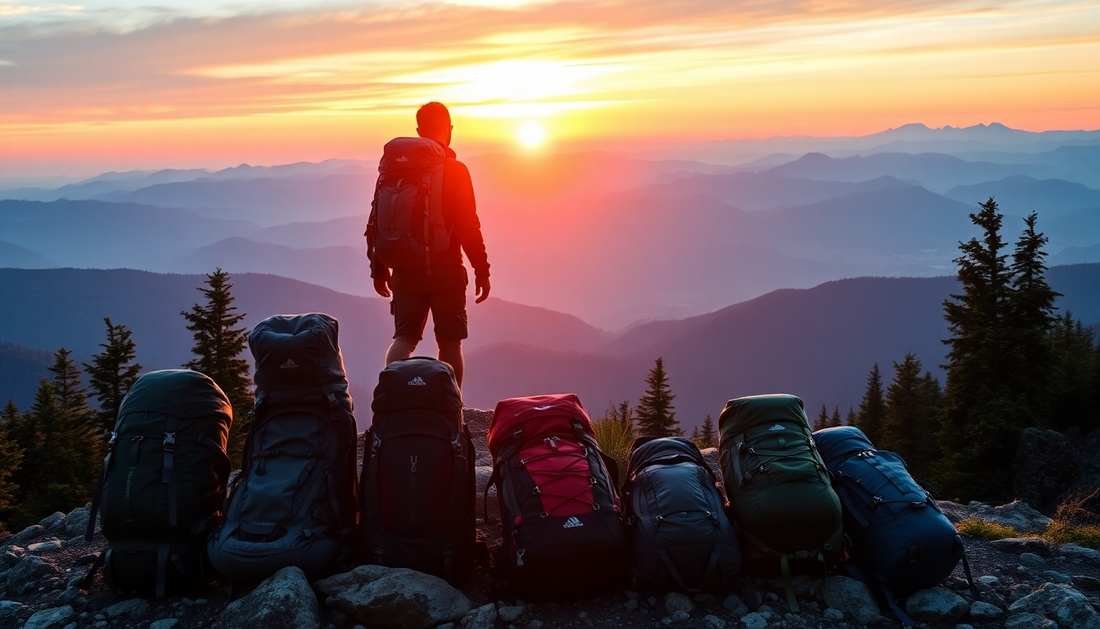
The Ultimate Guide to Hiking Backpacks: How to Choose the Perfect Pack for Your Outdoor Adventure
Share
Embarking on a hiking adventure is an exhilarating experience, but the key to a successful and comfortable journey lies in your choice of backpack. Whether you're planning a day hike or a multi-day trek, having the right hiking backpack can make all the difference in the world. In this comprehensive guide, we'll explore the different types of hiking backpacks, the essential factors to consider, and how to find the perfect pack for your outdoor adventures.
Types of Hiking Backpacks
When it comes to hiking backpacks, there are three main categories to consider:

Day Packs
Day packs are designed for shorter hikes and day trips. They typically range from 20 to 35 liters in capacity, making them lightweight and easy to carry. These packs are perfect for carrying essentials like water, snacks, and a light jacket.
Weekend Packs
Weekend packs are slightly larger, ranging from 35 to 50 liters in capacity. They're ideal for overnight or weekend trips, where you'll need to carry a bit more gear, such as a sleeping bag, extra layers, and camping equipment.
Extended-Trip Packs
For longer hikes and multi-day adventures, extended-trip packs are the way to go. These larger backpacks, typically ranging from 50 to 80 liters, are designed to carry all the necessary gear for a more extended journey, including a tent, cooking supplies, and more.
Key Factors to Consider
When choosing a hiking backpack, there are several important factors to keep in mind:
Capacity and Size
The size and capacity of your backpack will depend on the length and nature of your hike. Consider the amount of gear you'll need to carry, and choose a pack that can accommodate it comfortably.
Fit and Comfort
A well-fitting backpack is crucial for a comfortable and enjoyable hike. Pay attention to the adjustable features, such as the shoulder straps, hip belt, and back panel, to ensure a snug and customized fit.
Weight
The weight of the backpack itself can have a significant impact on your overall carrying load. Look for lightweight materials and features that won't add unnecessary bulk to your pack.
Durability and Materials
Hiking backpacks need to be able to withstand the rigors of the outdoors. Look for packs made from durable, high-quality materials like nylon or polyester, with reinforced stress points and weather-resistant coatings.
Features and Organization
Consider the features that will make your hike more comfortable and efficient, such as a hydration system, multiple access points, and well-designed compartments for organizing your gear.
How to Measure for the Perfect Fit
Achieving the perfect fit for your hiking backpack is crucial for comfort and stability on the trail. Here's how to measure yourself to find the right size:
Torso Length
Measure the distance from the base of your neck, where your spine meets your shoulders, to the top of your hip bones. This will help you determine the appropriate torso length for your backpack.
Hip Size
Measure the circumference of your hips at the widest point, usually around your hip bones. This will ensure the hip belt of your backpack fits snugly and distributes the weight properly.
Essential Features to Look For
When shopping for a hiking backpack, keep an eye out for these essential features:
Ventilation System
A well-designed ventilation system, such as a mesh back panel or suspended mesh, can help keep you cool and comfortable by promoting airflow.
Hydration Compatibility
Look for backpacks that are compatible with hydration systems, allowing you to stay hydrated on the go without the need to stop and access your water bottle.
Rain Cover
A removable rain cover can be a lifesaver in unexpected weather, keeping your gear dry and protected.
Multiple Access Points
Backpacks with multiple access points, such as side zippers or a top-loading design, can make it easier to quickly retrieve items without having to unpack the entire bag.
Popular Brands and Top Picks
When it comes to hiking backpacks, there are several reputable brands that offer high-quality, reliable options. Some of the most popular and well-regarded brands include Osprey, Deuter, Gregory, and The North Face. Each brand has its own unique features and specialties, so it's worth researching and trying on different models to find the perfect fit for your needs.
Care and Maintenance Tips
To ensure your hiking backpack lasts for many adventures, it's important to properly care for and maintain it. Here are some tips:
- Clean the pack regularly with a mild soap and water, and let it air dry completely before storing.
- Check the zippers, straps, and buckles for any signs of wear or damage, and replace or repair them as needed.
- Store your backpack in a cool, dry place, away from direct sunlight, which can cause the materials to degrade over time.
- Consider using a pack cover or rain cover when hiking in wet conditions to protect your gear.

Conclusion
Choosing the right hiking backpack is essential for a comfortable and successful outdoor adventure. By understanding the different types of packs, the key factors to consider, and how to find the perfect fit, you'll be well on your way to gearing up for your next hike. Remember to prioritize comfort, durability, and organization, and you'll be ready to tackle any trail with confidence. Happy hiking!
